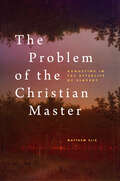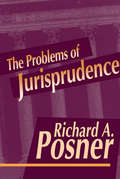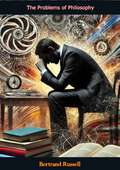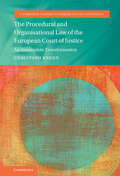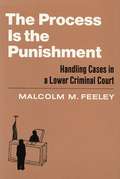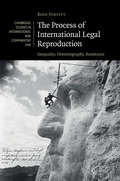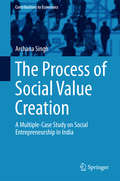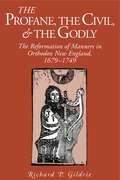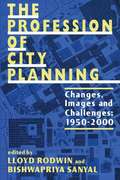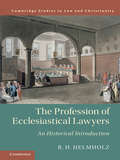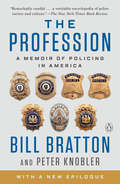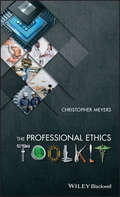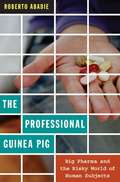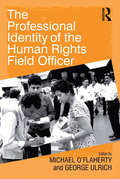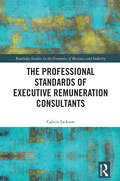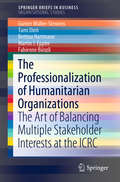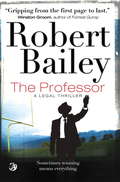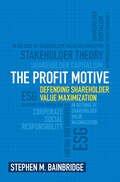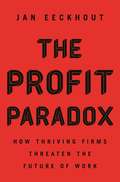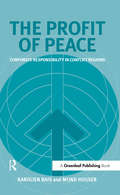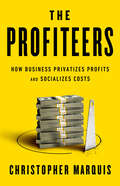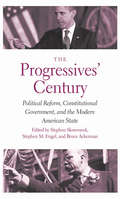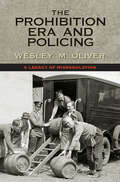- Table View
- List View
The Problem of the Christian Master: Augustine in the Afterlife of Slavery
by Matthew EliaA bold rereading of Augustinian thought for a world still haunted by slavery Over the last two decades, scholars have made a striking return to the resources of the Augustinian tradition to theorize citizenship, virtue, and the place of religion in public life. However, these scholars have not sufficiently attended to Augustine&’s embrace of the position of the Christian slaveholder. To confront a racialized world, the modern Augustinian tradition of political thought must reckon with its own entanglements with the afterlife of the white Christian master. Drawing Augustine&’s politics and the resources of modern Black thought into extended dialogue, Matthew Elia develops a critical analysis of the enduring problem of the Christian master, even as he presses toward an alternative interpretation of key concepts of ethical life—agency, virtue, temporality—against and beyond the framework of mastery. Amid democratic crises and racial injustice on multiple fronts, the book breathes fresh life into conversations on religion and the public square by showing how ancient and contemporary sources at once clash and converge in surprising ways. It imaginatively carves a path forward for the enduring humanities inquiry into the nature of our common life and the perennial problem of social and political domination.
The Problems of Jurisprudence
by Richard A. PosnerIn this book, one of our country’s most distinguished scholar-judges shares with us his vision of the law. For the past two thousand years, the philosophy of law has been dominated by two rival doctrines. One contends that law is more than politics and yields, in the hands of skillful judges, correct answers to even the most difficult legal questions; the other contends that law is politics through and through and that judges wield essentially arbitrary powers. Rejecting these doctrines as too metaphysical in the first instance and too nihilistic in the second, Richard Posner argues for a pragmatic jurisprudence, one that eschews formalism in favor of the factual and the empirical. Laws, he argues, are not abstract, sacred entities, but socially determined goads for shaping behavior to conform with society’s values. Examining how judges go about making difficult decisions, Posner argues that they cannot rely on either logic or science, but must fall back on a grab bag of informal methods of reasoning that owe less than one might think to legal training and experience. Indeed, he reminds us, the greatest figures in American law have transcended the traditional conceptions of the lawyer’s craft. Robert Jackson did not attend law school and Benjamin Cardozo left before getting a degree. Holmes was neither the most successful of lawyers nor the most lawyerly of judges. Citing these examples, Posner makes a plea for a law that frees itself from excessive insularity and takes all knowledge, practical and theoretical, as grist for its mill. The pragmatism that Posner espouses implies looking at problems concretely, experimentally, without illusions, with an emphasis on keeping diverse paths of inquiry open, and, above all, with the insistence that social thought and action be evaluated as instruments to desired human goals rather than as ends in themselves. In making his arguments, he discusses notable figures in jurisprudence from Antigone to Ronald Dworkin as well as recent movements ranging from law and economics to civic republicanism, and feminism to libertarianism. All are subjected to Posner’s stringent analysis in a fresh and candid examination of some of the deepest problems presented by the enterprise of law.
The Problems of Philosophy
by Bertrand RussellDive into the foundational questions of philosophy with Bertrand Russell's The Problems of Philosophy. This classic work, penned by one of the 20th century's most influential philosophers, provides an accessible and thought-provoking introduction to philosophical inquiry.Bertrand Russell, a renowned philosopher, logician, and Nobel laureate, examines some of the most enduring problems in philosophy, presenting them in a clear and engaging manner. Russell explores fundamental questions about the nature of reality, knowledge, and the limits of human understanding. Russell's lucid writing and keen analytical skills make complex philosophical concepts approachable for readers of all backgrounds.In this seminal text, Russell addresses key topics such as the distinction between appearance and reality, the existence and nature of matter, the theory of knowledge, and the problem of induction. He also delves into the nature of truth and falsehood, the limits of philosophical knowledge, and the relationship between philosophy and science.Russell's exploration is not merely theoretical; he provides concrete examples and practical applications of philosophical ideas, demonstrating their relevance to everyday life. His balanced approach combines rigorous analysis with a deep appreciation for the wonder and curiosity that drive philosophical inquiry.The Problems of Philosophy is an essential read for students of philosophy, educators, and anyone interested in deepening their understanding of the world. Russell's insightful and compelling treatment of philosophical issues invites readers to think critically about the nature of reality and our place within it.Join Bertrand Russell on a journey through the key questions that have shaped philosophical thought for centuries. The Problems of Philosophy remains a timeless and influential work, offering readers a profound and accessible guide to the enduring questions of human existence.
The Procedural and Organisational Law of the European Court of Justice: An Incomplete Transformation (Cambridge Studies in European Law and Policy)
by Christoph KrennHow should judges of the European Court of Justice be selected, who should participate in the Court's proceedings and how should judgments be drafted? These questions have remained blind spots in the normative literature on the Court. This book aims to address them. It describes a vast, yet incomplete transformation: Originally, the Court was based on a classic international law model of court organisation and decision-making. Gradually, the concern for the effectiveness of EU law led to the reinvention of its procedural and organisational design. The role of the judge was reconceived as that of a neutral expert, an inner circle of participants emerged and the Court became more hierarchical. While these developments have enabled the Court to make EU law uniquely effective, they have also created problems from a democratic perspective. The book argues that it is time to democratise the Court and shows ways to do this.
The Process is the Punishment: Handling Cases in a Lower Criminal Court
by Malcolm M. FeeleyIt is conventional wisdom that there is a grave crisis in our criminal courts: the widespread reliance on plea-bargaining and the settlement of most cases with just a few seconds before the judge endanger the rights of defendants. Not so, says Malcolm Feeley in this provocative and original book. Basing his argument on intensive study of the lower criminal court system, Feeley demonstrates that the absence of formal “due process” is preferred by all of the court’s participants, and especially by defendants. Moreover, he argues, “it is not all clear that as a group defendants would be better off in a more ‘formal’ court system,” since the real costs to those accused of misdemeanors and lesser felonies are not the fines and prison sentences meted out by the court, but the costs incurred before the case even comes before the judge—lost wages from missed work, commissions to bail bondsmen, attorney’s fees, and wasted time. Therefore, the overriding interest of the accused is not to secure the formal trappings of the judicial process, but to minimize the time, and money, spent dealing with the court. Focusing on New Haven, Connecticut’s, lower court, Feeley found that the defense and prosecution often agreed that the pre-trial process was sufficient to “teach the defendant a lesson.” In effect, Feeley demonstrates that the informal practices of the lower courts as they are presently constituted are more “just” than they are usually given credit for being. “... a book that should be read by anyone who is interested in understanding how courts work and how the criminal sanction is administered in modern, complex societies.”— Barry Mahoney, Institute for Court Management, Denver “It is grounded in a firm grasp of theory as well as thorough field research.”—Jack B. Weinstein, U.S. District Court Judge." a feature that has long been the hallmark of good American sociology: it recreates a believable world of real men and women.”—Paul Wiles, Law & Society Review. "This book's findings are well worth the attention of the serious criminal justice student, and the analyses reveal a thoughtful, probing, and provocative intelligence....an important contribution to the debate on the role and limits of discretion in American criminal justice. It deserves to be read by all those who are interested in the outcome of the debate." —Jerome H. Skolnick, American Bar Foundation Research Journal
The Process of International Legal Reproduction: Inequality, Historiography, Resistance (Cambridge Studies in International and Comparative Law #137)
by Rose ParfittThat all states are free and equal under international law is axiomatic to the discipline. Yet even a brief look at the dynamics of the international order calls that axiom into question. Mobilising fresh archival research and drawing on a tradition of unorthodox Marxist and anti-colonial scholarship, Rose Parfitt develops a new 'modular' legal historiography to make sense of the paradoxical relationship between sovereign equality and inequality. Juxtaposing a series of seemingly unrelated histories against one another, including a radical re-examination of the canonical story of Fascist Italy's invasion of Ethiopia, Parfitt exposes the conditional nature of the process through which international law creates and disciplines new states and their subjects. The result is a powerful critique of international law's role in establishing and perpetuating inequalities of wealth, power and pleasure, accompanied by a call to attend more closely to the strategies of resistance that are generated in that process.
The Process of Social Value Creation: A Multiple-Case Study on Social Entrepreneurship in India (Contributions to Economics)
by Archana SinghThis book discusses social entrepreneurship, especially in context of India. It focuses on understanding the whole process of social value creation, i.e. social entrepreneurship - opportunity identification, resource mobilisation, social value, capabilities of social entrepreneurs and innovation in three different types of social enterprises – (i) non-profit or charitable ones; (ii) non-profit social enterprise, sustainable with the combined income of grants, subsidies and own earned income; self-sustainable not-for-profit social enterprise; and hybrid social enterprise; and (iii) for-profit social enterprises. Sample cases of social entrepreneurs (Ashoka Fellows) were selected from three inter-linked sectors -- health, education and livelihood. To provide a comprehensive view, interviews were taken not only from the founders (social entrepreneurs), management personnel, and other employees, but also from the beneficiaries. The book comprises how, on the basis of cross-comparison between three types of social enterprises, several propositions and finally theoretical framework on social entrepreneurship have been developed. It proposes that social entrepreneurship can be acquired and that these social entrepreneurs can help solve the larger social problems faced both by developing and developed nations.
The Profane, the Civil, and the Godly: The Reformation of Manners in Orthodox New England, 1679–1749 (Kenneth Scott Latourette Prize in Religion and Modern Literature)
by Richard P. GildrieIn this prize-winning study of the sacred and profane in Puritan New England, Richard P. Gildrie seeks to understand not only the fears, aspirations, and moral theories of Puritan reformers but also the customs and attitudes they sought to transform. Topics include tavern mores, family order, witchcraft, criminality, and popular religion. Gildrie demonstrates that Puritanism succeeded in shaping regional society and culture for generations not because New Englanders knew no alternatives but because it offered a compelling vision of human dignity capable of incorporating and adapting crucial elements of popular mores and aspirations.
The Profession of City Planning: Changes, Images and Challenges, 1950-2000
by Lloyd Rodwin Bishwapriya SanyalIn thirty-four provocative and insightful chapters, the nation's leading planners present a definitive assessment of fifty years of city planning and establish a benchmark for the profession for the next fifty years. The book appraises what planners do and how well they do it, how and why their current activities differ from past practices, and how much and in what ways planners have or have not enhanced the quality of urban life and contributed to the intellectual capital of the field. How have the goals, values, and practices of planners changed? What do planners say about their roles and the problems they confront? What is the relevance of their skills, from design capabilities and environmental savvy to intermediate and long-term perspectives and the pragmatics of implementation? The contributors seeking to answer these questions include Anthony Downs, Nathan Glazer, Philip B. Herr, Judith E. Innes, Terry S. Szold, Lawrence J. Vale, and Sam Bass Warner, Jr. The Profession of City Planning contrasts with the main changes in the US over the second half of the twentieth century in city planning. Sector images of the practice and effects of planning on housing, transportation, and the environment, as well as the development of economic tools are also discussed.
The Profession of Ecclesiastical Lawyers: An Historical Introduction (Law and Christianity)
by R. H. HelmholzHistorians of the English legal profession have written comparatively little about the lawyers who served in the courts of the Church. This volume fills a gap; it investigates the law by which they were governed and discusses their careers in legal practice. Using sources drawn from the Roman and canon laws and also from manuscripts found in local archives, R. H. Helmholz brings together previously published work and new evidence about the professional careers of these men. His book covers the careers of many lesser known ecclesiastical lawyers, dealing with their education in law, their reaction to the coming of the Reformation, and their relationship with English common lawyers on the eve of the Civil War. Making connections with the European ius commune, this volume will be of special interest to English and Continental legal historians, as well as to students of the relationship between law and religion.
The Profession: A Memoir of Community, Race, and the Arc of Policing in America
by Peter Knobler Bill BrattonThe epic, transformative career of Bill Bratton, legendary police commissioner and police reformer, in Boston, Los Angeles, and New YorkWhen Bill Bratton became a Boston street cop after his return from serving in Vietnam, he was dismayed by the corrupt old guard, and it is fair to say the old guard was dismayed by him, too. But his success fighting crime could not be denied. Propelled by extraordinary results, Bratton had a dazzling rise, and ultimately a dazzling career, becoming the most famous police commissioner of modern times. The Profession is the story of that career in full.Everywhere he went, Bratton slashed crime rates and professionalized the vocation of the cop. He and his team created the revolutionary program CompStat, the Big Bang of modern data-driven policing. But his career has not been without controversy, and central to the reckoning of The Profession is the fundamental crisis of relations between the Black community and law enforcement; a crisis he now believes has been inflamed by the unforeseen consequences of some well-intentioned policies. Building trust between a police force and the community it is sworn to protect is in many ways, Bratton argues, the first task--without genuine trust in law enforcement to do what is right, little else is possible.The Profession is both a searching examination of the path of policing over the past fifty years, for good and also for ill, and a master class in transformative leadership. Bill Bratton was never brought into a police department to maintain the status quo; wherever he went--from Boston in the '80s to the New York Police Department in the '90s to Los Angeles after the beating of Rodney King to New York again in the era of unchecked stop-and-frisk--root-and-branch reinvention was the order of the day and he met the challenge. There are few other positions on Earth in which life-and-death stakes combine with intense public scrutiny and turbulent political crosswinds as they do for the police chief of a major American city, even more so after counterterrorism entered the mix in the twenty-first century. Now more than ever, when the role of the police in society is under a microscope like never before, Bill Bratton's authority on the subject of improving law enforcement is profoundly useful. A riveting combination of cop stories and community involvement, The Profession presents not only a fascinating and colorful life at the heights of law-enforcement leadership, but the vision for the future of American policing that we sorely need.
The Professional Ethics Toolkit
by Christopher MeyersThe Professional Ethics Toolkit by Christopher Meyers
The Professional Guinea Pig: Big Pharma and the Risky World of Human Subjects
by Roberto AbadieThe Professional Guinea Pig documents the emergence of the professional research subject in Phase I clinical trials testing the safety of drugs in development. Until the mid-1970s Phase I trials were conducted on prisoners. After that practice was outlawed, the pharmaceutical industry needed a replacement population and began to aggressively recruit healthy, paid subjects, some of whom came to depend on the income, earning their living by continuously taking part in these trials. Drawing on ethnographic research among self-identified "professional guinea pigs" in Philadelphia, Roberto Abadie examines their experiences and views on the conduct of the trials and the risks they assume by participating. Some of the research subjects he met had taken part in more than eighty Phase I trials. While the professional guinea pigs tended to believe that most clinical trials pose only a moderate health risk, Abadie contends that the hazards presented by continuous participation, such as exposure to potentially dangerous drug interactions, are discounted or ignored by research subjects in need of money. The risks to professional guinea pigs are also disregarded by the pharmaceutical industry, which has become dependent on the routine participation of experienced research subjects. Arguing that financial incentives compromise the ethical imperative for informed consent to be freely given by clinical-trials subjects, Abadie confirms the need to reform policies regulating the participation of paid subjects in Phase I clinical trials.
The Professional Identity of the Human Rights Field Officer
by George UlrichThe important and groundbreaking volume, The Professional Identity of the Human Rights Field Officer, completes the study of human rights field work begun in the earlier The Human Rights Field Operation: Law Theory and Practice (2007: Ashgate). Building on the critique of the field’s historical development and current situation featured in the earlier volume, O’Flaherty, Ulrich and their fellow contributors focus on the specific responsibilities of the individual human rights officer, and concentrate on vital issues of professionalism beyond the confines of any specific organization. Their expansion of the analysis in the case studies section of the first volume has resulted in an up to date global edition of significant academic interest to anyone within the field of human rights law.
The Professional Standards of Executive Remuneration Consultants (Routledge Studies in the Economics of Business and Industry)
by Calvin JacksonLove them or hate them, executive remuneration consultants are key players in remuneration committees’ pay determination processes. This book concerns the professional standards of executive remuneration consultants (and their ‘in-house’ counterparts; for example, Human Resources Director and Head of Reward) in providing remuneration committee advisory services. The author is a 25-year ‘veteran’ executive remuneration consultant, having worked around the world in this capacity (particularly in the financial services sector). This book is based on a qualitative empirical doctoral research exercise, involving 53 participants in the UK executive pay scene (including regulators, institutional shareholder bodies, proxy advisors, remuneration committees’ chairs/members, executive remuneration consultants and in-house executive reward specialists). The objective was to formulate conclusions that could be used to the benefit of UK practice and contribute to the relevant academic scholarship on executive remuneration consultants. The research covered 18 aspects, ranging from an examination of the independence of such consultants to whether there might be a specialised accreditation/qualification and/or licence to practise regime covering their services. It provides novel insights into this previously under-researched area of corporate governance/financial regulation. This book will be of interest to those involved in the UK executive remuneration scene, whether government, regulators or any of the other parties mentioned already (plus academics in universities and business schools). It is hoped too that overseas remuneration regimes that have respects in common with the UK’s will find this book useful.
The Professionalization of Humanitarian Organizations: The Art of Balancing Multiple Stakeholder Interests at the ICRC (SpringerBriefs in Business)
by Günter Müller-Stewens Tami Dinh Bettina Hartmann Martin J. Eppler Fabienne BünzliThis book offers deep insights into the functioning of humanitarian organizations (HOs) from a managerial perspective. Presenting an in-depth case study on the International Committee of the Red Cross (ICRC), it demonstrates how HOs can professionalize the management of their operations by adapting the institutional logic of private corporations and applying their tools and frameworks in the context of a non-profit-organization. The authors discuss the advantages of effective stakeholder and change management for HOs, as well as the tensions caused by conflicting institutional logics and ethical conflicts that arise as a result of a violation of the principles of an HO. The book appeals to anyone interested in managing non-governmental organizations more effectively.
The Professor
by Robert Bailey"A retired Professor of Law who hasn't tried a real case in forty years teams up with a former student who's yet to trial a case at all, in order to clear both of their names..." The Professor, introduces Thomas Jackson McMurtrie, a longtime law professor at the University of Alabama, who, 40 years after giving up a promising career as a trial lawyer to teach law students at the request of his mentor, Coach Paul "Bear" Bryant, retires to his farm an angry and bitter man, betrayed by both a Board member he mistook for a friend and his own failing health. Meanwhile, the young family of one of Tom's oldest friends is killed in a tragic collision with an 18-wheeler. Believing his career is over, Tom refers his friend to a brilliant, yet beleaguered, former student, Rick Drake, who begins to uncover that the truth behind the tragedy is buried in a tangled web of arson, bribery and greed. When a key witness is murdered on the eve of trial, the young attorney, in over his head and at the end of his rope, knows he needs help...and there's only one man who can help him. The Professor is the first in a series of tense legal thriller featuring the unusual and compelling legal team of McMurtie & Drake, combining the thrills and authenticity of a John Grisham novel for the audience that flocked to Friday Night Lights.
The Profiler: My Life Hunting Serial Killers and Psychopaths
by Pat Brown Bob AndelmanIn 1990, a young woman was strangled on a jogging path near the home of Pat Brown and her family. Brown suspected the young man who was renting a room in her house, and quickly uncovered strong evidence that pointed to him--but the police dismissed her as merely a housewife with an overactive imagination. It would be six years before her former boarder would be brought in for questioning, but the night Brown took action to solve the murder was the beginning of her life's work. Pat Brown is now one of the nation's few female criminal profilers--a sleuth who assists police departments and victims' families by analyzing both physical and behavioral evidence to make the most scientific determination possible about who committed a crime. Brown has analyzed many dozens of seemingly hopeless cases and brought new investigative avenues to light. In The Profiler, Brown opens her case files to take readers behind the scenes of bizarre sex crimes, domestic murders, and mysterious deaths, going face-to-face with killers, rapists, and brutalized victims. It's a rare, up-close, first-person look at the real world of police and profilers as they investigate crimes--the good and bad, the cover-ups and the successes.
The Profit Motive: Defending Shareholder Value Maximization
by Stephen M. BainbridgeWhat responsibility, if any, does a corporation have to society? How should corporations balance environmental, social, and governance factors? The Profit Motive addresses these questions of corporate purpose using historical, legal, and economic perspectives. Stephen M. Bainbridge enters the debate around corporate social responsibility to mount an unabashed defense of shareholder capitalism and maximizing shareholder value. The book offers context for the current questions about corporate purpose, and provides a reference going forward. Direct and corrective, The Profit Motive argues that shareholder value maximization is not only required by law, but what the law ought to require.
The Profit Paradox: How Thriving Firms Threaten the Future of Work
by Jan EeckhoutA pioneering account of the surging global tide of market power—and how it stifles workers around the worldIn an era of technological progress and easy communication, it might seem reasonable to assume that the world’s working people have never had it so good. But wages are stagnant and prices are rising, so that everything from a bottle of beer to a prosthetic hip costs more. Economist Jan Eeckhout shows how this is due to a small number of companies exploiting an unbridled rise in market power—the ability to set prices higher than they could in a properly functioning competitive marketplace. Drawing on his own groundbreaking research and telling the stories of common workers throughout, he demonstrates how market power has suffocated the world of work, and how, without better mechanisms to ensure competition, it could lead to disastrous market corrections and political turmoil.The Profit Paradox describes how, over the past forty years, a handful of companies have reaped most of the rewards of technological advancements—acquiring rivals, securing huge profits, and creating brutally unequal outcomes for workers. Instead of passing on the benefits of better technologies to consumers through lower prices, these “superstar” companies leverage new technologies to charge even higher prices. The consequences are already immense, from unnecessarily high prices for virtually everything, to fewer startups that can compete, to rising inequality and stagnating wages for most workers, to severely limited social mobility.A provocative investigation into how market power hurts average working people, The Profit Paradox also offers concrete solutions for fixing the problem and restoring a healthy economy.
The Profit Paradox: How Thriving Firms Threaten the Future of Work
by Jan EeckhoutA pioneering account of the surging global tide of market power—and how it stifles workers around the worldIn an era of technological progress and easy communication, it might seem reasonable to assume that the world’s working people have never had it so good. But wages are stagnant and prices are rising, so that everything from a bottle of beer to a prosthetic hip costs more. Economist Jan Eeckhout shows how this is due to a small number of companies exploiting an unbridled rise in market power—the ability to set prices higher than they could in a properly functioning competitive marketplace. Drawing on his own groundbreaking research and telling the stories of common workers throughout, he demonstrates how market power has suffocated the world of work, and how, without better mechanisms to ensure competition, it could lead to disastrous market corrections and political turmoil.The Profit Paradox describes how, over the past forty years, a handful of companies have reaped most of the rewards of technological advancements—acquiring rivals, securing huge profits, and creating brutally unequal outcomes for workers. Instead of passing on the benefits of better technologies to consumers through lower prices, these “superstar” companies leverage new technologies to charge even higher prices. The consequences are already immense, from unnecessarily high prices for virtually everything, to fewer startups that can compete, to rising inequality and stagnating wages for most workers, to severely limited social mobility.A provocative investigation into how market power hurts average working people, The Profit Paradox also offers concrete solutions for fixing the problem and restoring a healthy economy.
The Profit of Peace: Corporate Responsibility in Conflict Regions
by Karolien Bais Mijnd HuijserIt may seem a strange notion to give the private sector a role in conflict prevention or resolution, but multinational corporations (MNCs) do have some characteristics that make them good partners in a well-designed strategy for peace and stability. By focusing on their core competencies, their presence in a conflict region can help to provide prosperity for rebuilding society and its institutions, and improved respect for human rights. This book is not a song of praise for MNCs in general. There is a litany of examples of companies that feel no shame in profiting from conflicts by trading weapons or illegal resources, that prolong war by supporting one or other of the parties, or that are only in a war-torn country because the lawlessness suits them well. Even companies that refrain from such criminal activities cannot be envisaged as potential peace-builders if they profit unscrupulously from cheap labour or cheap subcontractors. Instead, this book is about corporations that are disposed to ethical, responsible entrepreneurship: companies that balance their desire for profit with compliance with international business and human rights standards and with a genuine investment in local workers, environmental protection, social development and stability. Worldwide about 60,000 MNCs work in over 70 conflict regions. They operate in regions where social unrest is harshly repressed, where outright fighting takes place, or where civil war has recently ended. Whatever the attitude of multinationals and whatever their area of business, they influence conflicts or are themselves influenced by conflicts. Even if they do not directly invest in or trade with a conflict region, they always risk being associated with those conflicts. The Profit of Peace examines how multinationals can use their core business competencies to promote peace and stability in conflict regions and what role – if any – business has in diplomacy. To investigate these questions the authors interviewed CEOs and high-level managers of multinationals working in 'challenging' countries such as Afghanistan, Burma and Rwanda. The interviewees provided extraordinarily candid views on both the practical and ethical issues that occur when operating under extremely volatile circumstances. The lessons learned by these managers make the book invaluable for any manager working for a large company in a region of unrest. Two vital elements emerged. Firstly, the ability to manage cultural differences is a key factor for success. Without a keen sense of the differences in management styles, in perceptions of ethics and morality, and in the values behind political opinions, every peace effort is doomed to fail. Secondly, ethically correct decisions do not necessarily lead to ethically correct results. It was not the objective of the authors to judge which of the parties in conflict regions are right or wrong. Rather, they wanted to find out what kind of attitude at the end of the day contributes most effectively to conflict prevention or stabilisation of a region. In other words, in this book corporate responsibility is measured by the results and not by the intentions. All of the CEOs interviewed for this book were well aware of the fact that their companies operating in conflict regions would always influence the conflict one way or another. This awareness in itself is quite extraordinary, and it shows that the indifferent comment "business is business" by and large belongs to a past era. Also extraordinary was that the managers allowed such a frank look into their sanctuary, since this candour makes them all the more vulnerable to criticism. Through the information from the interviewees and from other managers who have experience in conflict regions, the book outlines the ingredients for an approach that can best lead to a solution of conflicts and to greater stability. It will only be in the long run that we will be able to establish how successful the new profession of 'business diplomat' can be, but in the m
The Profiteers: How Business Privatizes Profits and Socializes Costs
by Christopher MarquisAn exposé of how society pays for corporations' "free lunch" and the cost of environmental damage, low wages, systemic discrimination, and cheap goods. In an age when business leaders solemnly profess dedication to principles of environmental and social justice, Christopher Marquis&’s provocative investigation into the real costs of doing business reveals the way that leaders of the corporate world gaslight to evade responsibilities by privatizing profits and socializing costs. &“Who pays?&” for the resulting climate and environmental damage, racism, low wages, and cheap goods: the average citizen and the taxpayer. By bringing to light ideas that today are on the fringe but rapidly making their way into the mainstream, Marquis outlines a new regenerative paradigm for business in society. He tells of a group of pioneers trying to not just reform but transform the way business is conducted all over the world. By taking novel actions to reimagine business operations in responsible ways, minimize their negative impacts, and create new ways for business to properly absorb their hidden costs, these leaders provide blueprints to move the needle on vexing social and environmental issues. What&’s in it for leaders of the corporate world? The model of reform presented provides clear guidance on how to get ahead of the curve as an emerging economic order is formed. No business can lead from the front if it is morally-backward looking. History has shown time and again that those who get out in front of emerging changes in our social and environmental landscape protect themselves from inevitable eclipse.
The Progressives' Century: Political Reform, Constitutional Government, and the Modern American State
by Bruce Ackerman Stephen M. Engel Stephen SkowronekA landmark work on how the Progressive Era redefined the playing field for conservatives and liberals alike. During the 1912 presidential campaign, Progressivism emerged as an alternative to what was then considered an outmoded system of government. A century later, a new generation of conservatives criticizes Progressivism as having abandoned America's founding values and miring the government in institutional gridlock. In this paradigm-shifting book, renowned contributors examine a broad range of issues, including Progressives' interpretation of the Constitution, their expansion and redistribution of individual rights, and reforms meant to shift power from political parties to ordinary citizens.
The Prohibition Era and Policing: A Legacy of Misregulation
by Wesley M. OliverLegal precedents created during Prohibition have lingered, leaving search-and-seizure law much better defined than limits on police use of force, interrogation practices, or eyewitness identification protocols. An unlawful trunk search is thus guarded against more thoroughly than an unnecessary shooting or a wrongful conviction.Intrusive searches for alcohol during Prohibition destroyed middle-class Americans' faith in police and ushered in a new basis for controlling police conduct. State courts in the 1920s began to exclude perfectly reliable evidence obtained in an illegal search. Then, as Prohibition drew to a close, a presidential commission awakened the public to torture in interrogation rooms, prompting courts to exclude coerced confessions irrespective of whether the technique had produced a reliable statement.Prohibition's scheme lingered long past the Roaring '20s. Racial tensions and police brutality were bigger concerns in the 1960s than illegal searches, yet when the Supreme Court imposed limits on officers' conduct in 1961, searches alone were regulated. Interrogation law during the 1960s, fundamentally reshaped by the Miranda ruling, ensured that suspects who invoked their rights would not be subject to coercive tactics, but did nothing to ensure reliable confessions by those who were questioned. Explicitly recognizing that its decisions excluding evidence had not been well-received, the Court in the 1970s refused to exclude identifications merely because they were made in suggestive lineups. Perhaps a larger project awaits—refocusing our rules of criminal procedure on those concerns from which Prohibition distracted us: conviction accuracy and the use of force by police.
